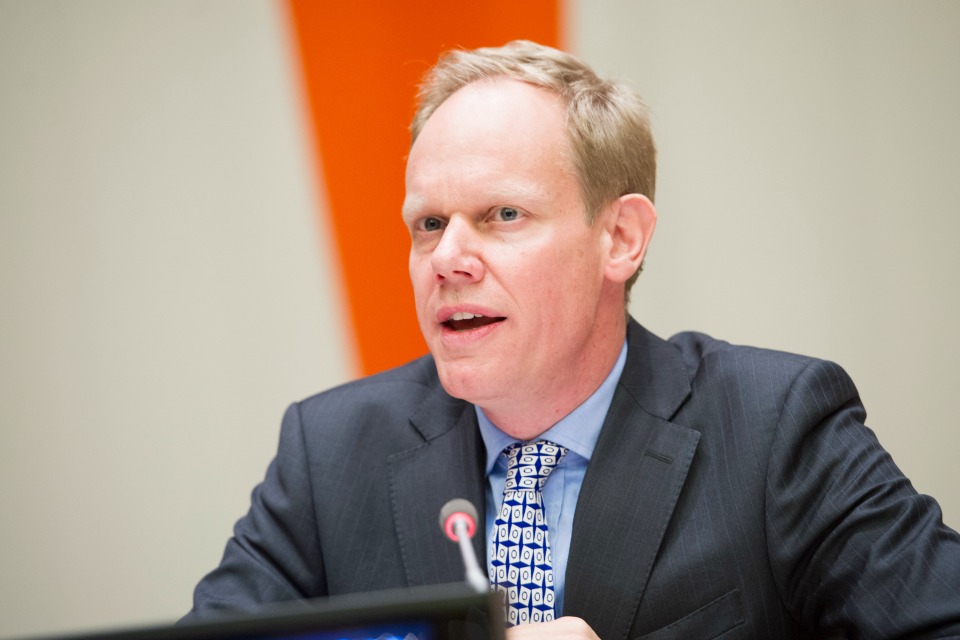"We cannot afford to repeat history."
Statement by Ambassador Matthew Rycroft, UK Permanent Representative to the United Nations, in UN Security Council Meeting on MEPP and Syria

Since the Quartet Report’s that came out in July, we have seen a worrying acceleration of some Israeli policies in the West Bank that are, as the Report makes clear, eroding the viability of the two-state solution.
Far from stopping settlement expansion, as the Quartet recommended, we have seen Israel push forward plans for over 1,500 settlement units as well as the continued demolition of Palestinian structures.
The numbers speak for themselves. Over 800 structures destroyed this year, over 1,000 people displaced, including over 500 children. As the UK Minister for the Middle East, Tobias Ellwood, made clear earlier this month, these policies “fundamentally call into question Israel’s commitment to the two-state solution”.
The demolition orders issued against the Palestinian village of Susiya and the Khan Al Ahmar School, East of Jerusalem, are particularly concerning. Such steps would have a terrible human impact on the inhabitants of Susiya and the children of Khan Al Ahmar. What hope is there for the two-state solution when communities are simply removed from the map, when futures are literally bulldozed to the ground?
So once again, I hope we can all urge Israel to cease its systematic policy of settlement expansion, demolition of Palestinian structures, and limits on Palestinian development.
The Quartet Report also set out the damaging effect of incitement and violence. We deplore incitement on both sides of the Israeli-Palestinian conflict, including any comments that could stir up hatred and prejudice.
Though levels of violence have dropped in recent months, we continue to call on the parties to do all they can to de-escalate tensions and prevent incitement. We also continue to support the revival of the Tripartite Committee on Incitement to address all allegations of incitement on both sides.
Turning to Gaza, we remain extremely worried about the ongoing dire situation there. It is estimated that 90% of Gaza’s water is not fit for consumption, or even for agricultural use. Gaza continues to have the highest unemployment rates in the world. And the risk of a return to conflict hangs heavy over Gaza, as shown by the rocket attacks and Israeli response last month. Militant groups in Gaza must permanently cease rocket fire and other attacks against Israel.
The UK welcomes the steps taken by the Palestinian Authority and Israel to improve the energy, gas, electricity and water situation in Gaza. These are significant advances that will improve conditions on the ground and it is critical these measures are implemented quickly, given the severity of the situation.
We are also encouraged that education and health facilities are largely rebuilt. But reconstruction is far from complete. Efforts now need to focus on completing house rebuilding, and reviving the productive sectors, stimulating exports, and creating jobs.
We too have a role to play. Donors must honour all commitments that are still outstanding from the Cairo conference. The UK remains committed to doing so, and to reaching those in need.
I thank the Secretary-General once again for his briefing and would like to reaffirm our full and continued support for the work of Nikolay Mladenov, UN Special Co-ordinator for the Middle East Peace Process, and we look forward to hearing from him in closed consultations later this morning.
Before I give up the floor, Mr President, I’d like to take this opportunity, as we’re in open session, to publically welcome the announcement on Friday by the US and Russia to renew the Cessation of Hostilities in Syria. This is a long-awaited, positive step. The level of violence has dropped in recent days, and I hope that this will continue, and bring with it full humanitarian access, and eventually, I hope, an environment that allows talks to resume between the parties.
But we have been here before. The violence has dropped, only to rise to new levels of barbarity. We cannot afford to repeat history. So let us all urge the parties to honour their commitments, and let us specifically call on Russia to use its influence to restrain Asad.
This will be no simple feat. Earlier this week, Asad said it was his objective to regain the entire country by force; something that he is unable to do alone; and something that would only prolong this conflict for many years to come. For sake of the hundreds of thousands of Syrians killed in this conflict, for the millions upon millions displaced, this simply cannot come to pass.
Thank you.